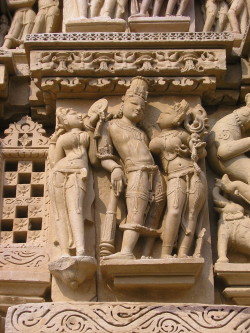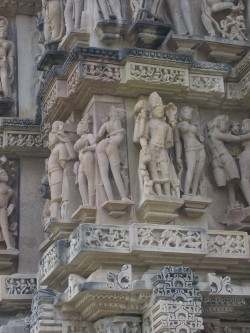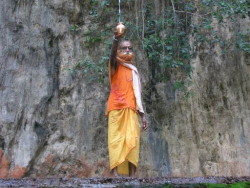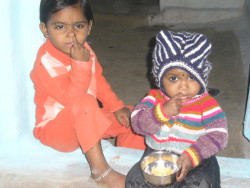 Photo.
Photo. Details
from the Khajuraho temple - the temple complex in the town © Joe Gill.
A
small middle aged man on a push bike approached me in the street, he had dark
glasses and a 1950s flicked-back hairstyle. He seemed a little unsteady but
harmless.
He proclaimed me his friend, which is not unusual in
India, and in broken English explained he had a friend in Australia called
Eileen and wanted to write a letter to her. I agreed to help him. After a few
weeks in India you come
to suspect that every approach from an Indian has a price tag attached. Writing
a letter was a new one, and I decided to go along in the spirit of innocence
until proven guilty.
He took me to his house down a narrow alley, a simple place with blue washed
walls and a yard where his son was trying to fix a bicycle. He told me about his
life, he showed me the break in his leg that had not been fixed properly and
meant he lost his hotel job, and most painfully a picture of his son who had
died the year before, on the same day, the first of Diwali - the smiling picture
of the son was almost too much to bear.
|
Photo. The Khajuraho
temple - the temple complex in the town. © Joe Gill.
The Chandela temples of Khajuraho in central India, built in the tenth
century A.D, display stunningly explicit sexual sculptures. |
 |
The day was the first of Diwali, the country's biggest
festival, a time of offering pooja, letting off nerve shaking firecrackers,
present giving and banging drums into the early hours. But in the home of
Mr. Chobay, the air was melancholy. His wife brought us
masala tea and sat by the wall, in orange sari and wearing dark glasses like her
husband.
Chobay told me the whole
story of Rama, the centre of the Ramayana story and the heart of the Diwali
celebration when Rama's coronation as king is celebrated. Rama is an incarnation
of Krishna, near the top of the vast pantheon of 330
Hindu million gods.
With jewellery made by his parents, he told the story of life
through the metaphor of the day - sunrise, morning, afternoon, sunset. The sun
would go down but rise again, birth, death, rebirth. No matter what his agenda
was, the tears shed by his wife and the death of their eldest son was genuine.
He said he had lost all his physical strength since his boy died.
I left with a sandalwood necklace and a silver ring inlaid with some sort of
"moon stone", and an invitation to dinner the next night. I wrote the letter to
Eileen in Melbourne, dictated by him, and then did the same thing at the
internet cafe. He was very grateful. I bought some sweets for his kids for
Diwali. He clearly had almost no money coming in from his bike hiring
business.
Next day Diwali was continuing, the men - women
were indoors as far as I could tell - were dancing to a drum
beat, singing and waving peacock feathers above their head in processions at the temples and in
the streets from dawn till night.
Photo. The Diwali dance at Khajuraho. © Joe Gill.
The men danced to drums, singing and waving peacock feathers from
dawn till dusk. |
 |
|
Photo. A holy
man at Panda Falls, who collects water.
© Joe Gill.
Panda Falls is in a wildlife sanctuary some 25 kilometres from
Khajuraho.
|
 |
I went back to Chobay's at dusk, finding his house with the help of some
kids. [Often the kids here seem to speak the best English, perhaps because they
are still in school learning it]. We sat on a matt in his "living room", next to
a large noisy fan.
Photo. Mr. Chobay's neighbours - picture of
Mr. Chobay's neighbours' children.
© Joe Gill. |
 |
He wanted to smoke a joint, which was clearly his
favourite pastime, and helped him "relax, relax".
The dark glasses hid both his and his wife's tears,
he said.
After the smoke his wife brought the food. A "thali" of
some sort, with vegetables, a custard-like curd, chapatis, and other dishes that
fit no description. I was pretty stoned by now. The food was cold and the most
tasteless I had eaten, the chapatti chewy and inedible. I had no choice but
to swill it all with water from the jug - a no-no for foreigners here - as
otherwise I would not be able top swallow a bite. She had to be the worst cook
this side of Calcutta. Perhaps the bitterness of bereavement was what I tasted,
and I tried to look grateful while apologising for leaving food on the plate.
I did my best and let Chobay finish what I left. Afterwards he wrote his
address, and indicated that perhaps I might send him some money. Medicine for
his wife and him, stuff for the kids etc. I left, my stomach just about holding
down what I had eaten, stumbling back to the hotel and my friends.
The next day the man in the CD-burning, erotic books and jewellery shop told
me he knew Chobay, that he smoked and drank and only wanted money to feed his
habit. I kind of believed him, but one is always looking for an honest man amid
all the touts and randoms approaching you in India. Chobay had a family and a
gammy leg and lost his eldest son, and that was enough to evince sympathy for
his plight.
He eventually caught up with me at the bus station as I was leaving town.
I promised to write and gave him a chunk of my hash block "for father", the old
man liked a smoke too apparently. He gave me one more broach necklace and we
said goodbye. I can be thankful that I was only mildly sick for a couple of
days. I will think carefully about dinner invitations in future. One of the
saddest moments I had ever witnessed, and I would not have missed it for
anything.
Joe Gill, 5 November 2005
Additional
information
As Lonely Planet describe India: "Nothing in the
country is ever quite predictable; the only thing to expect is the unexpected,
which comes in many forms and will always want to sit next to you. India is a
litmus test for many travellers - some are only too happy to leave, while others
stay for a lifetime". For more information, click on the link: www.LonelyPlanet.com.
Information sources for India:
www.webindia123.com
www.rajasthantourism.gov.in
|
Presentation of the author:
Joe Gill is a
freelance journalist working in London, specialising in the non-profit
sector, international development and Latin America.
Photo. Joe Gill from England.
© Joe Gill. |
 |
Contact
details: Joe Gill, journalist, London 44 207 607 4120.
(M)
07748597168
(H) 0207 6074120
E-mail:
joegill00@hotmail.com.
